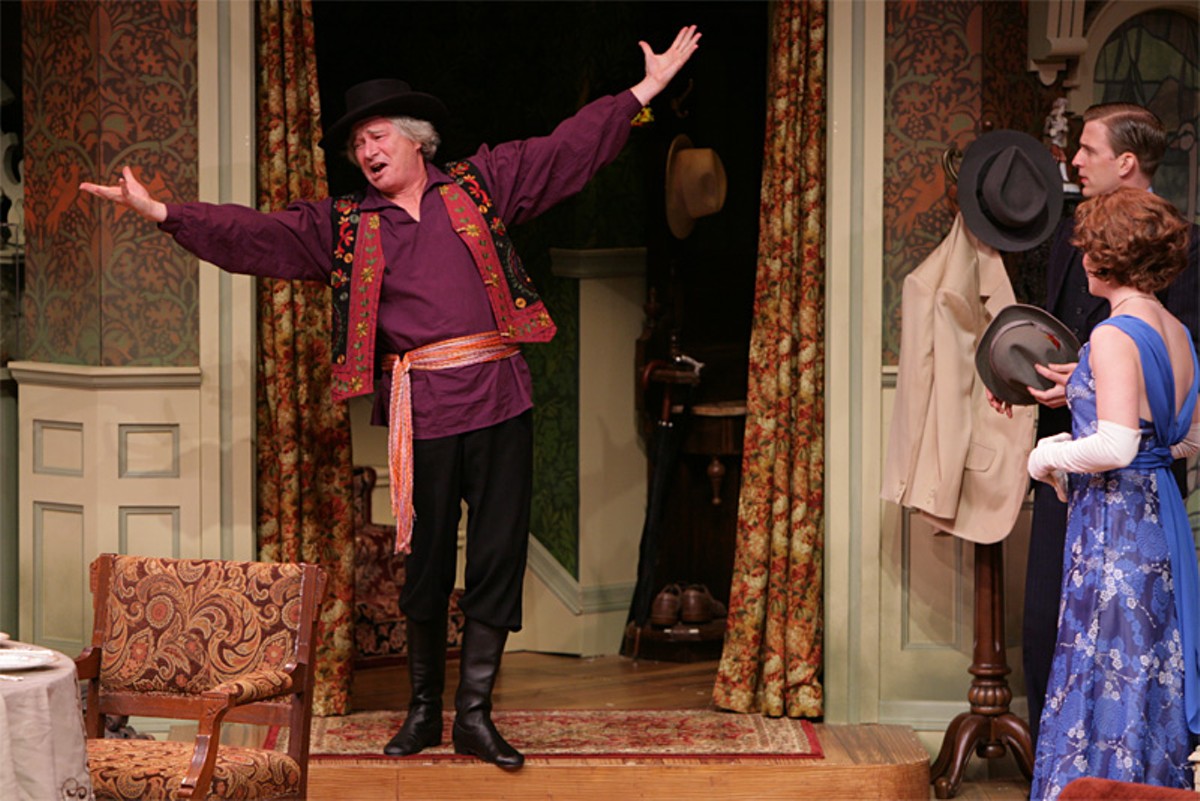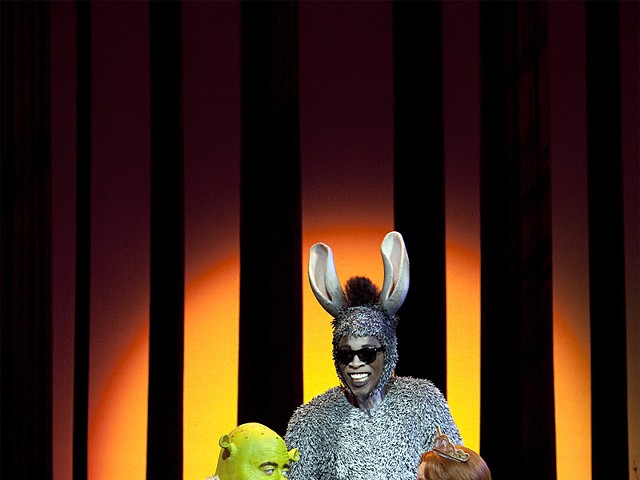If you attend the rollicking Repertory Theatre of St. Louis staging of George S. Kaufman and Moss Hart's genial 1936 comedy You Can't Take It With You, there are three good reasons you might want to enter the auditorium earlier than usual. First, word of mouth should ensure that the production soon will sell out; hence, the lobby will be too congested for comfort. Second, added time will allow you to savor John Ezell's glorious scenic design of Martin Vanderhof's rambling, ramshackle Manhattan home. Ezell's meticulous set, invitingly lit by Peter Sargent, actually makes us eager for the proceedings to begin. And third, it is a pleasure to hear the 1930s big-band music wafting through the house. Tommy Dorsey's version of "I'm Getting Sentimental Over You" seemed especially apt, because You Can't Take It With You is an exercise in sentiment from bustling start to cuddly conclusion.
Sentiment for a kind of theater that is almost extinct — a vibrant theater that as recently as four decades ago thrived on the vagaries of large-cast plays. In You Can't Take It With You, Kaufman and Hart employ nineteen characters to tell the tale of three generations of one beguiling (if eccentric) family. To watch this play is to be reminded, with a sense of rue, of how marginalized today's theater has become by its dependence on three- and four-character scripts. The only recent work that approaches this kind of reach is Tracy Letts' scathing thirteen-character family drama August: Osage County, but what a contrasting America these two plays depict.
The more amiable You Can't Take It With You is yet another variation on Romeo and Juliet, except that here poison has been replaced with pickled pigs' feet. Instead of a blood feud, our two young lovers are separated by caste and creed. Alice Sycamore (Amelia McClain, charmingly rambunctious) has grown up among an anarchic brood whose philosophy is to do whatever makes you happy. Tony Kirby (Benjamin Eakeley) is the scion of a conservative, society-conscious family driven by wealth. The shenanigans that ultimately unite the young lovers are so skillfully crafted that halfway through the evening the play kicks into a rare kind of theatrical cruise control. There's no stopping the fun.
Anderson Matthews is especially vivid in the showy role of Kohlenkhov, a Russian expatriate who excels as ballet instructor, dance critic and wrestler. In a shameless performance that hurls caution to the wind, the ever-reliable Matthews plays havoc with vowels and brazenly mangles the English language. Every time Kohlenkhov enters the Vanderhof home, the stage all but bursts with extravagance. There is also remarkable work from Barbara Kingsley in the secondary role of Tony's patrician mother. On the page Mrs. Kirby is a one-dimensional snob — and she's usually played that way. But from the moment Kingsley opens her mouth, her character is fully realized and individualistic.
The very mannered Mrs. Kirby is an ideal foil for Alice's playwriting, portrait-painting mother, Penny Sycamore. Penny usually registers as a lovable if absentminded featured role. But Carol Schultz instills the character with nuance and empathy. The pixilated Penny views the world with a sense of breathless wonder. Somewhere in her genealogy, she is distantly related to Harvey's Elwood P. Dowd. When Penny and her polar opposite Mrs. Kirby are onstage together, they evoke undercurrents of a shared curiosity, if not envy. This, thanks to the work of two outstanding actresses.
Indeed, perhaps the most remarkable attribute of the delightful Rep production, which has been directed by Steven Woolf, is that it tilts the story's dynamic from male to female. Usually our adversaries are Grandpa Vanderhof (Joneal Joplin), who believes that life is pretty simple if you just relax, and the uptight, Wall Street-dealing Mr. Kirby (Jeffrey Hayenga). But Joplin's Grandpa is a performance without surprises. The lines will carry Grandpa so far, but at some point the actor has to bring something to this party. Because Grandpa lacks irony, grit or even whimsy, Penny dominates the evening.
Of course, Grandpa delivers most of the evening's homilies, including the title phrase. Although he is talking about money, "you can't take it with you" might just as well be describing the inherent nature of theater. Once a play is over, only the memories remain. The Rep's merry romp provides those in abundance.






